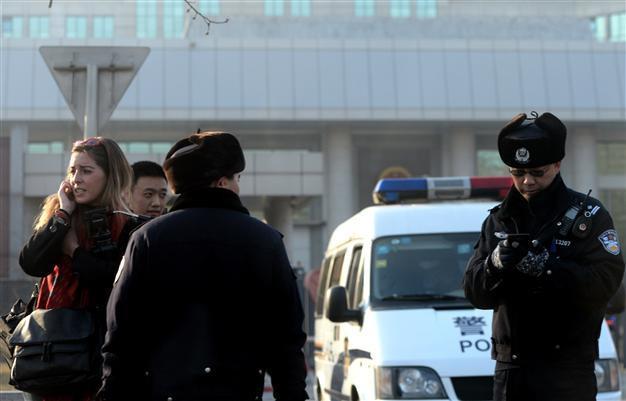Chinese anti-graft activists on trial amid crackdown on dissent
BEIJING - Agence France-Presse

Chinese police stop a foreign journalist (L) outside the No. 1 Intermediate court on Jan 22 as strict security was imposed ahead of the trial of Xu Zhiyong, one of China's most prominent dissidents, for his part in anti-corruption protests. AFP photo
Two Chinese anti-corruption activists will go on trial Jan. 23 for publicly demanding officials disclose their assets, lawyers said, as a key financial backer of their rights movement was bailed after apparently confessing to authorities.
Dozens of police surrounded the Beijing court where Zhao Changqing and Hou Xin will follow the movement's founder, Xu Zhiyong, in standing trial this week for their role in the loose-knit New Citizens Movement.
They are accused of involvement in protests calling for government officials to disclose their financial assets, seen as a key reform against graft.
The ruling Communist Party has launched a much-publicised anti-corruption campaign of its own, but Beijing is extremely wary of any organised dissent against its rule.
Wang Gongquan, a multi-millionaire backer of the movement who had been held since September, was bailed after he apparently distanced himself from it, authorities said late Jan. 22.
A venture capitalist said to have provided funding for Xu, he was released after confessing that he had helped "organise and incite criminal activities" according to a statement by a Beijing court. The release indicates that Wang will not face trial.
The activists face maximum sentences of up to five years for their role in the protests, and are all but certain to be found guilty by China's politically controlled courts.
"I am not optimistic that the court can handle this case fairly," Zhao's lawyer Zhang Xuezhong told AFP.
Zhao, a student leader during the 1989 Tiananmen Square democracy protests, has since 1997 served two prison terms totalling eight years for his continued pro-democracy activities.
The New Citizens Movement is tiny but has developed in recent years with organised dinners to discuss various causes - from education equality to official graft - and holding small, sporadic street protests. Between 20 and 40 other activists linked to the movement have been detained since 2013, members say.
Three were put on trial in the central province of Jiangxi after they posted photos of themselves online holding signs urging official asset disclosure. The arrests have been seen as part of a broader campaign to enforce ideological unity since President Xi Jinping took charge of the ruling Communist party in late 2012.
